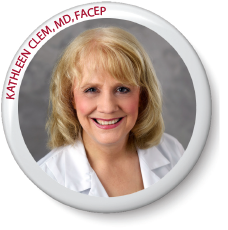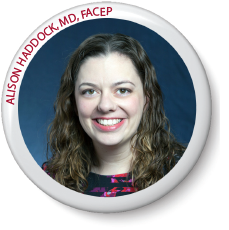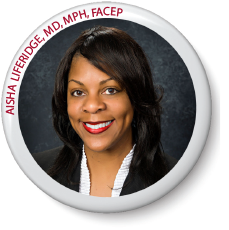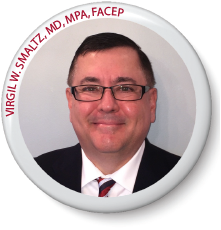
Each October at ACEP’s annual Council meeting, the ACEP Council elects new leaders for the College. The Council, which represents all 53 chapters, 37 sections of membership, the Association of Academic Chairs in Emergency Medicine, the Council of Emergency Medicine Residency Directors (CORD), the Emergency Medicine Residents’ Association (EMRA), and the Society for Academic Emergency Medicine, will elect the College’s President-Elect, four members to the ACEP Board of Directors, and the Council Vice Speaker. This month, we’ll meet the Board of Directors candidates, and in October, we’ll meet the Council Officer candidates.
Explore This Issue
ACEP Now: Vol 36 – No 09 – September 2017Platform Statements
The following members are candidates for Board of Directors. They responded to this question:
How will your skills, background, knowledge, or unique abilities help you as a member of the Board to address the major issues facing emergency medicine in the next three years?
Stephen Huntley Anderson, MD, FACEP (incumbent, Washington)
 Current Professional Positions: staff emergency department physician, MultiCare Auburn Medical Center, Auburn, Washington
Current Professional Positions: staff emergency department physician, MultiCare Auburn Medical Center, Auburn, Washington
Internships and Residency: internship/residency, general surgery, University of Michigan, Ann Arbor; chief resident, University of Michigan; University of Washington, Seattle
Medical Degree: MD, University of Michigan (1981)
Response
Experience, passion, and a commitment to the future define my skills set for the Board. For over 30 years, I’ve practiced emergency medicine and devoted myself as a department chairman, chair of education, and chief of staff at my hospital. I honed the abilities to prove the value of emergency medicine to my partners and colleagues. Leadership in your own shop focuses your commitment while teaching you the value of teamwork that works across all lines of service. What’s best at the gurney needs to be the easy solution hospital-wide (be it EHRs, boarding, or continuity of care). I’m grounded in my patients’ best interests.
With many of our strategic battles now being waged on the state level with Medicaid and insurance companies, I’ve fought and won against flawed policy at that level. Having found win-win solutions by developing a care coordination program in Washington that is now a blueprint nationally for other state programs, I understand how to stand up for prudent layperson access to care while achieving better health outcomes, increased provider satisfaction, and saving money. We don’t need more roadblocks or revolving doors; we need more tools like we created with the Washington State 7 Best Practices that I co-wrote.
That experience and passion got me elected to the Board three years ago. There, we created the Clinical Emergency Data Registry (CEDR) (to augment reimbursement while owning our metrics), created a Diversity and Inclusion Task Force (to remove obstacles to success), and fought balance billing and the flawed policies of the American Health Care Act. I was honored to give the Colin Rorrie Health Policy lecture on coordinating care at ACEP15. Through these and countless other battles, I worked tirelessly to find solutions for over the last three years on the Board.
I don’t feel my work is done.
So my focus is still three to 10 years down the line, through advocacy, mentoring, and creating a structure within ACEP to continue to keep us at the head of the table in the house of medicine. “Been there, done this. Proud but not satisfied,” yet I’m still passionate about continuing to help lead for years to come.
Kathleen Clem, MD, FACEP (American Association of Women Emergency Physicians Section)
 Current Professional Positions: professor of emergency medicine, University of Central Florida College of Medicine, Orlando; chief medical officer, vice president, Florida Hospital East Orlando
Current Professional Positions: professor of emergency medicine, University of Central Florida College of Medicine, Orlando; chief medical officer, vice president, Florida Hospital East Orlando
Internships and Residency: emergency medicine residency, Loma Linda University, Loma Linda, California
Medical Degree: MD, Loma Linda University School of Medicine (1989)
Response
I recognize that the current challenges facing our specialty, and indeed the entire house of medicine, are unprecedented. ACEP needs experienced leaders to lead through this critical time in health care. I have been an involved ACEP member since 1991 and have over 20 years of experience as a leader for both community and academic emergency medicine. I know how to work within and for complex systems as we shape the future of emergency medicine.
I have served as a medical director; tackled reimbursement issues for my group, tort reform at the state level, and residency support issues; and understand that unnecessary requirements of our time and energy matter. I also understand the challenges associated with addressing these issues. As a past academic chair, current chief medical officer, and health system vice president, I bring additional experience to navigate challenges for our specialty. I have led efforts for hospitals to be incentivized to rapidly admit patients, supported resources for timely consults, and worked to build bridges with other specialties. I value, seek out, and treasure opportunities to listen to physicians. The importance of listening-to-understand cannot be overstated. I would continue to seek these opportunities as a member of the Board of Directors and then collaborate with the Board to incorporate the concerns and solutions offered by our members into the work we do at ACEP.
I would continue ACEP’s focus on specific strategies to recruit and retain young physicians by increasing designated chapter leadership positions for residents and leadership development tracks. I would continue to work with CORD and EMRA to bring synergy around these efforts as well.
I spent 18 years as an academic chief and chair at Level 1 trauma centers, started the emergency medicine residency at Duke University, and was the chair at Loma Linda during the San Bernardino mass shootings. I have worked my share of nights, weekends, and holidays, and I have worked in small single-coverage emergency departments, too. My current employer has enthusiastically endorsed my involvement with ACEP. I recognize that emergency departments and the physicians who staff them are crucial to America’s health care. I want the opportunity to be at the forefront of ACEP’s work to promote our core values and continue to deliver the highest quality of care for our patients.
Carrie de Moor, MD, FACEP (Freestanding Emergency Centers Section)
 Current Professional Positions: chairman, president, and CEO, Code 3 Emergency Partners, LLC; chairman/founder, Code 3 Emergency Physicians
Current Professional Positions: chairman, president, and CEO, Code 3 Emergency Partners, LLC; chairman/founder, Code 3 Emergency Physicians
Internships and Residency: emergency medicine residency, Texas Tech University/Thomason Hospital, El Paso; internship, department of pediatrics, University of Texas Medical Branch Children’s Hospital, Galveston
Medical Degree: MD, Texas Tech University Health Sciences Center School of Medicine, Lubbock/El Paso (2005)
Response
Although I have an early career background in academics and as a medical director at a Level 1 trauma center, what differentiates me as a candidate and where I can fill a void on the ACEP Board right now is my significant experience in not only starting, managing, and growing a physician-owned business but also my experience in both facility-based and physician billing. We all know that the insurance industry has taken aim at emergency medicine.
Despite this assault, I have devoted a large amount of my administrative time to protecting and defending my group’s independent practice by carefully studying insurance company behavior, learning their games, and devising strategies to overcome their predatory practices. I don’t have all the answers, and at times, I have had occasional setbacks and challenges. I have learned a lot of things along the way.
I am proud to say I have created a practice environment that allows physicians to be back in the driver’s seat and in control of their practice. It is possible to stand up to the insurance industry that doesn’t want to appropriately pay us. It is possible, no matter what your practice environment, to have a career that you enjoy and where you have a sense of ownership or control. I will bring the business know-how, resiliency, strategic thinking, negotiation skills, and a deep understanding of payer behavior to the Board. But more important, I will bring optimism. The future can be better than the present for all emergency physicians, and we have the ability to make certain that it is so. I will not represent one type of practice, I will represent all emergency physicians and do so without influence and will be fearless in the pursuit of a better tomorrow for all of us.
John T. Finnell, MD, MSc, FACEP (Indiana)
 Current Professional Positions: fellowship program director, clinical informatics, Indiana University, Indianapolis; president, American Medical Informatics Association (AMIA) Academic Forum; member, AMIA Board of Directors; member, AMIA Education Committee; American Board of Emergency Medicine (ABEM) senior case examiner reviewer; ABEM item writer; ABEM oral examiner; ABEM case development panel
Current Professional Positions: fellowship program director, clinical informatics, Indiana University, Indianapolis; president, American Medical Informatics Association (AMIA) Academic Forum; member, AMIA Board of Directors; member, AMIA Education Committee; American Board of Emergency Medicine (ABEM) senior case examiner reviewer; ABEM item writer; ABEM oral examiner; ABEM case development panel
Internships and Residency: emergency medicine residency, University of California, San Francisco–Fresno
Medical Degree: MD, University of Vermont, Burlington (1991)
Response
I am a practicing emergency physician and ACEP member for over 22 years. I work in Indianapolis at Eskenazi Health. Our hospital is a Level 1 trauma center and one of the teaching facilities for Indiana University’s emergency medicine residency program. My primary role is to lead the clinical informatics fellowship program. I am also a research scientist at the Regenstrief Institute. There are three major issues that currently impact the practice of emergency medicine: psychiatric boarding, the opiate epidemic, and reimbursement.
As a research scientist, I will bring wisdom and analytic skills to help your Board provide solutions for these problems. Regarding psychiatric boarding, how is this defined? Each of us, in our own facilities, uses different terminology to define this common problem. We should aim to find a common definition. Regarding opiates, while we are often able to identify patients, we have few treatment options. Resources should be pooled and patients prioritized. As a research scientist, I’ve led many similar projects and have made critical decisions to help us think strategically about our future.
As an educator with a subspecialization in informatics, I will provide your Board with the relevant expertise it needs to help lead us forward. Data is the cornerstone in providing relevant clinical care. We need data to help us make more informed treatment decisions at the bedside. This same clinical data, when aggregated, can be used to help inform others of the value of emergency medicine. These types of data will allow us to better demonstrate how minor complaints can be true emergencies. We have a duty to educate payers of a patient’s fundamental right to access care.
As a mentor, I’ve been fortunate to have great mentors that have allowed me to grow. A great mentor doesn’t tell you what needs to be done or how to do it; he or she is a good listener. A great mentor asks you questions and poses challenges designed to help you see problems that you may have not identified, to look further ahead than you may be currently looking, or to encourage a different perspective. I will draw upon my unique skills as a research scientist and informatician to help lead your ACEP Board and offer a sounding board to test your ideas and your concerns.
Alison Haddock, MD, FACEP (Texas)
 Current Professional Positions: assistant professor of emergency medicine, director of health policy: advocacy, department of emergency medicine, Baylor College of Medicine, Houston
Current Professional Positions: assistant professor of emergency medicine, director of health policy: advocacy, department of emergency medicine, Baylor College of Medicine, Houston
Internships and Residency: emergency medicine residency, University of Michigan, Ann Arbor
Medical Degree: MD, Cornell Medical College (2007)
Response
The biggest issues that emergency medicine will face in the coming years are policy and reimbursement issues. For the past several years, emergency medicine has faced an increasingly hostile environment in many states due to the actions of insurers, regulators, and legislators. We must be prepared to defend our value as a specialty and our patients’ right to access emergency care. We have been challenged on prudent layperson, out-of-network billing, and our commitment to providing universal access to emergency care. My strongest skills set is in this policy world.
On the national level, I have many years of experience with the Federal Governmental Affairs Committee and am serving my second term on the NEMPAC Board. As of late, we have seen our biggest challenges on the state level, and having spent the past several years serving as chair of the State Legislative/Regulatory Committee, I have been engaged with leaders from states around the country as they have fought to defend their patients’ right to access emergency care. I have developed relationships with Emergency Department Practice Management Association (EDPMA) leaders by serving on the ACEP-EDPMA Joint Task Force. As we continue our legislative and regulatory work around the country, my knowledge and experience can help us gather the data and choose the tactics that we need to protect patients and demonstrate the value of emergency care.
Additionally, I have lived and worked in different states, from Michigan to Washington to California to Texas, and practiced in different environments, from working single-coverage for a small democratic group to large community sites for a big group to an academic urban county hospital. This breadth of experience helps me to understand the challenges that our members face wherever they may work.
I would bring generational diversity to the Board as a current member of the Young Physicians Section, which is a perspective not currently represented on the ACEP Board. Earlier in our careers, emergency physicians often have a different outlook and emphasis, and I am excited to bring that fresh perspective to the Board.
I also have a solid breadth of experience with different aspects of the College. I have been involved in the activities of three different chapters and am currently serving on the Board of Directors of the Texas College of Emergency Physicians. Within the national organization, I not only have policy experience, but I have served on the EMRA Board of Directors, have completed a term on the Steering Committee, and have served several times on Council Reference Committees. My time on the Education Committee gave me an inside look at our annual meeting, a large event that has a huge impact on our membership and our budget. My varied experience within ACEP has developed my leadership skills, and I am now ready to be a focused, passionate, collaborative Board member in service of all aspects of our College.
Jon Mark Hirshon, MD, FACEP (incumbent, Maryland)
 Current Professional Positions: professor, department of emergency medicine and department of epidemiology and public health, University of Maryland School of Medicine, Baltimore; senior vice-chair of the University of Maryland, Baltimore Institutional Review Board
Current Professional Positions: professor, department of emergency medicine and department of epidemiology and public health, University of Maryland School of Medicine, Baltimore; senior vice-chair of the University of Maryland, Baltimore Institutional Review Board
Internships and Residency: emergency medicine residency, Johns Hopkins Hospital, Johns Hopkins University, Baltimore; preventive medicine residency, Johns Hopkins Bloomberg School of Public Health
Medical Degree: MD, University of Southern California School of Medicine, Los Angeles (1990)
Response
Board service isn’t a hobby; it is a serious commitment of thought, energy, time, and passion. ACEP’s mission is to promote the highest quality of emergency care. We are the leading advocate for emergency physicians, our patients, and the public. As a member of the ACEP Board of Directors for the past three years, I have been and remain passionately dedicated to improving access to high-quality emergency care in the United States and globally for you, our colleagues, and our patients.
For over 25 years, I have been a clinician, an educator, and a physician leader. Whether treating a patient with a STEMI, teaching wide-eyed interns the finer points of a lung exam, or speaking to unseen thousands through the television, I tirelessly advocate for our specialty. The key traits of an outstanding emergency physician—the abilities to work together as a team leader, to communicate clearly and effectively, and to make thoughtful decisions based upon the available data—are all necessary aspects to being a valuable member of ACEP’s Board.
As a physician board-certified in both emergency medicine and preventive medicine, as well as having a doctorate in epidemiology, I bring an exceptionally strong background in understanding data and the impact of data-driven policy on populations. My background, rich in data analysis and interpretation, is an incredibly important asset to the Board, as it will assure that we can have strong, effective public policy based upon high-quality science.
In our current environment of health policy uncertainty, my passion shines through, whether at the bedside, in the boardroom, or in front of policymakers and the public. I will continue to thoughtfully, passionately, and tirelessly advocate for you and our profession as I continue to advocate for my patients to address the many challenges we face.
Aisha Liferidge, MD, MPH, FACEP (Washington, D.C.)
 Current Professional Positions: assistant professor, department of emergency medicine, and director, emergency medicine health policy fellowship, George Washington University School of Medicine and Health Sciences, Washington, D.C.; assistant professor, department of health policy, Milken Institute of Public Health, George Washington University
Current Professional Positions: assistant professor, department of emergency medicine, and director, emergency medicine health policy fellowship, George Washington University School of Medicine and Health Sciences, Washington, D.C.; assistant professor, department of health policy, Milken Institute of Public Health, George Washington University
Internships and Residency: emergency medicine residency, University of Maryland Medical System department of emergency medicine, Baltimore
Medical Degree: MD, University of North Carolina School of Medicine, Chapel Hill (2003)
Response
Driven by purpose and passion, I have a proven track record of leadership that results in organizational growth and the advancement of landmark issues. While I was EMRA president, its budget hit the $1 million mark, which was unprecedented at the time. As President of the District of Columbia Chapter ACEP, I led revitalization efforts that resulted in doubled revenue and a 50 percent increase in membership. While I was chair of the ACEP Associate Membership Task Force, significant progress was made on the delicate topic of membership for non-board-certified providers. Currently, I serve as the chair of the trailblazing Diversity and Inclusion Task Force, which sets ACEP apart as a courageous champion of this important initiative. Additionally, I’ve served on ACEP’s Public Health and Injury Prevention, CEDR, and Steering committees.
The challenges that we face are far more complex than our founders could have ever imagined. Crucial issues such as the devaluation of emergency care as an essential service, the devastating opioid crisis, and the daunting challenge of sustainable health care financing beg our immediate attention and creativity. The approach must be strategic and skilled through effective health policy. As a senior leader in health policy at George Washington University in Washington, D.C., I have been uniquely prepared to do just this. I understand how the federal government, agencies, private entities, and think tanks operate and how they are most effectively influenced. I also understand the implementation of change through policy. Having forged beneficial relationships with key stakeholders, my skills set additionally includes the ability to effectively employ health policy strategy that utilizes myriad collaborative approaches.
As ACEP charts crucial territory, now is the time to promote experienced leadership that is purposeful, passionate, and policy-minded to ensure that our voice is not only heard but also respected and heeded.
Virgil W. Smaltz, MD, MPA, FACEP (New York)
 Current Professional Positions: self-employed emergency physician working as an independent contractor at Arnot Ogden Medical Center, Elmira, New York, and Oswego Hospital, Oswego, New York
Current Professional Positions: self-employed emergency physician working as an independent contractor at Arnot Ogden Medical Center, Elmira, New York, and Oswego Hospital, Oswego, New York
Internships and Residency: emergency medicine residency, West Virginia University, Morgantown
Medical Degree: MD, Marshall University School of Medicine, Huntington, West Virginia (1993)
Response
Insurance companies, the government, and others are affecting our ability to care for patients. My experience in small (West Virginia) and large (New York) chapters allows me to have a broad perspective on the issues. I was involved in passing the prudent layperson standard in West Virginia and continue to be involved in fighting for patient protections in New York. I will bring to the ACEP Board of Directors someone who has worked in many aspects of emergency medicine.
I started my career as a clerk and then as a manager in the emergency department. I have volunteered as an EMT, firefighter, paramedic, and flight medic. I have worked as a staff physician and as a director. My work background has been as a hospital employee, small and large contract group employee, and now as a locum tenen. This varied employer background gives me insight into how issues affect the delivery of care in varied situations. I am currently working with residents in a community-based emergency medicine residency, and my daughter is a second-year medical student. I have definitely become more aware of the issues facing our residents and students and how we must address them to ensure their success in their future careers. I have an excellent perspective on the issues that we are faced with. It would be easy to say I have all of the answers or even some of them.
In reality, these issues are complex, and only through collaboration will ACEP be able to effectively address them. Among my ACEP accomplishments, I have been a Reference Committee chair and chair of the Bylaws Committee. This allowed me to polish the skills necessary to work with other like-minded and strong-willed individuals. My ability to work collaboratively with other team members will be an important asset.





No Responses to “2017 ACEP Elections Preview: Meet the Board of Directors Candidates”